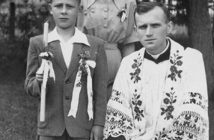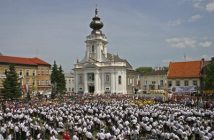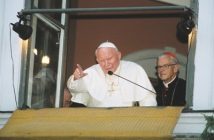Colloquio con monsignor Jan Zając, vescovo ausiliare dell’Arcidiocesi di Cracovia e rettore del Santuario della Divina Misericordia a Łagiewniki
• Monsignor vescovo, conobbe don Karol Wojtyła subito dopo essere entrato nel seminario di Cracovia. Come si percepisce da questa prospettiva la beatificazione di Giovanni Paolo II?
• Fu esattamente nell’ottobre del 1957, così tanto tempo fà… Da questa prospettiva vedo che il mio vecchio Professore che all’epoca incontrai da seminarista, e poi il mio Vescovo, al cui fianco lavorai per tutta la vita sacerdotale, ha mantenuto lo stesso atteggiamento verso ogni individuo. Un atteggiamento di rispetto e fiducia, cordialità e amore. Colgo il fatto di portarlo sugli altari come un’occasione per ricordare al mondo la figura di Giovanni Paolo II e i suoi valori che portava per tutta la vita, indicandoci la via dell’unione con Dio.
• La beatificazione di Giovanni Paolo II avverrà il giorno della Festa della Divina Misericordia, istituita proprio da questo papa. Monsignor vescovo, è il rettore del più importante santuario di questo culto. Che responsabilità sente in questo momento?
• Don Karol Wojtyła ci insegnava che, se un uomo viene chiamato a un impegno, deve adempierci appieno. Cerco insieme ai miei collaboratori di fare tutto affinché i pellegrini, che arriveranno da tutto il mondo, possano vivere il mistero dell’incontro con Gesù Misericordioso. Offrendo il nostro servizio ai pellegrini, ci prendiamo cura di condurli sulle strade indicate da Giovanni Paolo II, che ha già raggiunto la meta di questa strada. Egli ha creduto completamente alla Divina Misericordia, e ha indicato la santità come la misura della vita cristiana. Imboccare questa strada e portarci i pellegrini comporta tanta responsabilità per il patrimonio conferitoci da Giovanni Paolo II il Grande.
• Non Le dispiace un po’ Monsignor vescovo di non poter assistere alla beatificazione in Piazza San Pietro a Roma?
• Tale sensazione ovviamente sorge. Tuttavia mi sento onorato che sarò quel giorno quì a Łagiewniki, in un posto così importante per la strada della vita e dell’insegnamento di Giovanni Paolo II. Tanto più visto che i mezzi di comunicazione di oggi riescono ad allargare la comunità dalla Piazza San Pietro molto oltre il Vaticano. Con la mia anima sarò sicuramente lì, alle reliquie di Giovanni Paolo II. Il Santo Padre da vivo mi diceva molte volte: sono presente a Łagiewniki con la mia anima. Nel giorno della sua beatificazione è difficile quindi pensare a Cracovia Łagiewniki se non come alla “ seconda Roma”.
• Che significato avrà la beatificazione per il culto della Divina Misericordia?
• Sicuramente aprirà nuove prospettive a quelli che vorrannò attingere da ciò che Giovanni Paolo II ci ha trasmesso nel suo insegnamento. Egli chiamava a ricercare il Signore e a ritrovare i segni della Sua presenza nel mondo. Ha lasciato i segnali che portano alla comunione con Dio. L’esperienza di questa beatificazione ci rafforzerà nella strada indicata da Giovanni Paolo II all’incontro con il Signore e all’apertura all’altro uomo. Non è possibile essere un uomo dominato dalla Misericordia Divina se non si è misericordioso con il prossimo. Giovanni Paolo II inginocchiandosi davanti al Signore, si inginocchiava altresì davanti ad ogni singolo uomo. Tale strada si riesce a capire meglio a Łagiewniki, alla tomba di Santa Faustina, la cui missione affascinò un tempo il giovane Karol Wojtyła. La beatificazione accenderà di nuovo “il fuoco della Misericordia”, perché come insegnava il Beato: “Nella Misericordia di Dio il mondo troverà la pace, e l’uomo la felicità”.
• Monsignor vescovo, conobbe don Karol Wojtyła subito dopo essere entrato nel seminario di Cracovia. Come si percepisce da questa prospettiva la beatificazione di Giovanni Paolo II?
• Fu esattamente nell’ottobre del 1957, così tanto tempo fà… Da questa prospettiva vedo che il mio vecchio Professore che all’epoca incontrai da seminarista, e poi il mio Vescovo, al cui fianco lavorai per tutta la vita sacerdotale, ha mantenuto lo stesso atteggiamento verso ogni individuo. Un atteggiamento di rispetto e fiducia, cordialità e amore. Colgo il fatto di portarlo sugli altari come un’occasione per ricordare al mondo la figura di Giovanni Paolo II e i suoi valori che portava per tutta la vita, indicandoci la via dell’unione con Dio.
• La beatificazione di Giovanni Paolo II avverrà il giorno della Festa della Divina Misericordia, istituita proprio da questo papa. Monsignor vescovo, è il rettore del più importante santuario di questo culto. Che responsabilità sente in questo momento?
• Don Karol Wojtyła ci insegnava che, se un uomo viene chiamato a un impegno, deve adempierci appieno. Cerco insieme ai miei collaboratori di fare tutto affinché i pellegrini, che arriveranno da tutto il mondo, possano vivere il mistero dell’incontro con Gesù Misericordioso. Offrendo il nostro servizio ai pellegrini, ci prendiamo cura di condurli sulle strade indicate da Giovanni Paolo II, che ha già raggiunto la meta di questa strada. Egli ha creduto completamente alla Divina Misericordia, e ha indicato la santità come la misura della vita cristiana. Imboccare questa strada e portarci i pellegrini comporta tanta responsabilità per il patrimonio conferitoci da Giovanni Paolo II il Grande.
• Non Le dispiace un po’ Monsignor vescovo di non poter assistere alla beatificazione in Piazza San Pietro a Roma?
• Tale sensazione ovviamente sorge. Tuttavia mi sento onorato che sarò quel giorno quì a Łagiewniki, in un posto così importante per la strada della vita e dell’insegnamento di Giovanni Paolo II. Tanto più visto che i mezzi di comunicazione di oggi riescono ad allargare la comunità dalla Piazza San Pietro molto oltre il Vaticano. Con la mia anima sarò sicuramente lì, alle reliquie di Giovanni Paolo II. Il Santo Padre da vivo mi diceva molte volte: sono presente a Łagiewniki con la mia anima. Nel giorno della sua beatificazione è difficile quindi pensare a Cracovia Łagiewniki se non come alla “ seconda Roma”.
• Che significato avrà la beatificazione per il culto della Divina Misericordia?
• Sicuramente aprirà nuove prospettive a quelli che vorrannò attingere da ciò che Giovanni Paolo II ci ha trasmesso nel suo insegnamento. Egli chiamava a ricercare il Signore e a ritrovare i segni della Sua presenza nel mondo. Ha lasciato i segnali che portano alla comunione con Dio. L’esperienza di questa beatificazione ci rafforzerà nella strada indicata da Giovanni Paolo II all’incontro con il Signore e all’apertura all’altro uomo. Non è possibile essere un uomo dominato dalla Misericordia Divina se non si è misericordioso con il prossimo. Giovanni Paolo II inginocchiandosi davanti al Signore, si inginocchiava altresì davanti ad ogni singolo uomo. Tale strada si riesce a capire meglio a Łagiewniki, alla tomba di Santa Faustina, la cui missione affascinò un tempo il giovane Karol Wojtyła. La beatificazione accenderà di nuovo “il fuoco della Misericordia”, perché come insegnava il Beato: “Nella Misericordia di Dio il mondo troverà la pace, e l’uomo la felicità”.

The Way of John Paul II, the Path of Divine Mercy
An interview with Rev. Jan Zając, Auxiliary Bishop of the Cracow Archdiocese and Rector of the Divine Mercy Sanctuary.
• Your Eminence made the acquaintance of Rev. Karol Wojtyła shortly after entering the seminary in Cracow. From where you stand now how do you see this in the light of the beatification of John Paul II?
• It was in October 1957, so long ago… When I think about it today, I see that my former professor, whom I met in those distant days as a seminarian and who later became my bishop, by whose side I worked for the whole of my life as a priest, always had the same attitude towards every human being. An attitude of respect and trust, kindness and love. I see his elevation within the Catholic Church as a welcome opportunity to remind the world of the person behind Pope John Paul II and the values that he believed in throughout his life, both of which show us how to be unified with God.
• The beatification of John Paul II takes place on the feast of the Divine Mercy, established by the Pope himself. Your Eminence is the Rector of the most important shrine devoted to the Divine Mercy within the Catholic Church, but what kind of responsibility do you feel at the moment?
• Rev. Karol Wojtyła taught that if a man is called to a task, he should do his utmost in order to fulfil it. My associates and I try to do absolutely everything to enable pilgrims from around the world to experience the mysteries behind their meeting with the Merciful Jesus. Serving the pilgrims, we make every effort to lead them along the same road as that which was taken by John Paul II, following in his footsteps, although of course he has already reached his destination. He believed utterly and completely in God’s Mercy and always spoke of sanctity as a measure of a Christian life. Going down this road together with the pilgrims creates an enormous sense of responsibility with regard to the legacy left by the great Pope John Paul.
• Do you not regret just a little that you will not be in St. Peter’s Square in Rome on the day of the beatification?
• Of course, I do have such a feeling. However, I feel also honoured that on this particular day I will be in Łagiewniki, a place so important to the life and teaching of John Paul II. Especially that today through modern technology and the media it is possible to widen the community in St. Peter’s Square far beyond the confines of the Vatican. Certainly, I’ll be there in spirit, by the relics of John Paul II. The Holy Father used to say to me repeatedly: ‘I am in Łagiewniki in spirit.’ On the day of his elevation it is hard not to think of the Krakow-Łagiewniki link as anything other than as a ‘second Rome’.
• What significance will the beatification have for the followers of the Divine Mercy?
• It will certainly provide new opportunities for those who wish to benefit from the teachings of John Paul II. He urged us to seek God and find signs of his presence in the world. Indeed, he left us signposts along the road to achieving unification with God. The experience of this beatification will make us stronger for our journey to the final meeting with God, a road already travelled by Pope John Paul II, and to open ourselves to other human beings. He often stressed that there can be no love of God, if there is no love for man. You cannot be a man overwhelmed by God’s mercy when you are not merciful to your neighbour. John Paul II when kneeling before the Lord was at the same time kneeling before each and every man. This approach is best understood in Łagiewniki through the grave of St. Faustyna, whose mission once fascinated the young Karol Wojtyła. The beatification will re-ignite the ‘fire of Mercy’ again, because, as John Paul II taught: ‘It is only in the mercy of God that the world will find peace and man happiness.’
• Your Eminence made the acquaintance of Rev. Karol Wojtyła shortly after entering the seminary in Cracow. From where you stand now how do you see this in the light of the beatification of John Paul II?
• It was in October 1957, so long ago… When I think about it today, I see that my former professor, whom I met in those distant days as a seminarian and who later became my bishop, by whose side I worked for the whole of my life as a priest, always had the same attitude towards every human being. An attitude of respect and trust, kindness and love. I see his elevation within the Catholic Church as a welcome opportunity to remind the world of the person behind Pope John Paul II and the values that he believed in throughout his life, both of which show us how to be unified with God.
• The beatification of John Paul II takes place on the feast of the Divine Mercy, established by the Pope himself. Your Eminence is the Rector of the most important shrine devoted to the Divine Mercy within the Catholic Church, but what kind of responsibility do you feel at the moment?
• Rev. Karol Wojtyła taught that if a man is called to a task, he should do his utmost in order to fulfil it. My associates and I try to do absolutely everything to enable pilgrims from around the world to experience the mysteries behind their meeting with the Merciful Jesus. Serving the pilgrims, we make every effort to lead them along the same road as that which was taken by John Paul II, following in his footsteps, although of course he has already reached his destination. He believed utterly and completely in God’s Mercy and always spoke of sanctity as a measure of a Christian life. Going down this road together with the pilgrims creates an enormous sense of responsibility with regard to the legacy left by the great Pope John Paul.
• Do you not regret just a little that you will not be in St. Peter’s Square in Rome on the day of the beatification?
• Of course, I do have such a feeling. However, I feel also honoured that on this particular day I will be in Łagiewniki, a place so important to the life and teaching of John Paul II. Especially that today through modern technology and the media it is possible to widen the community in St. Peter’s Square far beyond the confines of the Vatican. Certainly, I’ll be there in spirit, by the relics of John Paul II. The Holy Father used to say to me repeatedly: ‘I am in Łagiewniki in spirit.’ On the day of his elevation it is hard not to think of the Krakow-Łagiewniki link as anything other than as a ‘second Rome’.
• What significance will the beatification have for the followers of the Divine Mercy?
• It will certainly provide new opportunities for those who wish to benefit from the teachings of John Paul II. He urged us to seek God and find signs of his presence in the world. Indeed, he left us signposts along the road to achieving unification with God. The experience of this beatification will make us stronger for our journey to the final meeting with God, a road already travelled by Pope John Paul II, and to open ourselves to other human beings. He often stressed that there can be no love of God, if there is no love for man. You cannot be a man overwhelmed by God’s mercy when you are not merciful to your neighbour. John Paul II when kneeling before the Lord was at the same time kneeling before each and every man. This approach is best understood in Łagiewniki through the grave of St. Faustyna, whose mission once fascinated the young Karol Wojtyła. The beatification will re-ignite the ‘fire of Mercy’ again, because, as John Paul II taught: ‘It is only in the mercy of God that the world will find peace and man happiness.’










